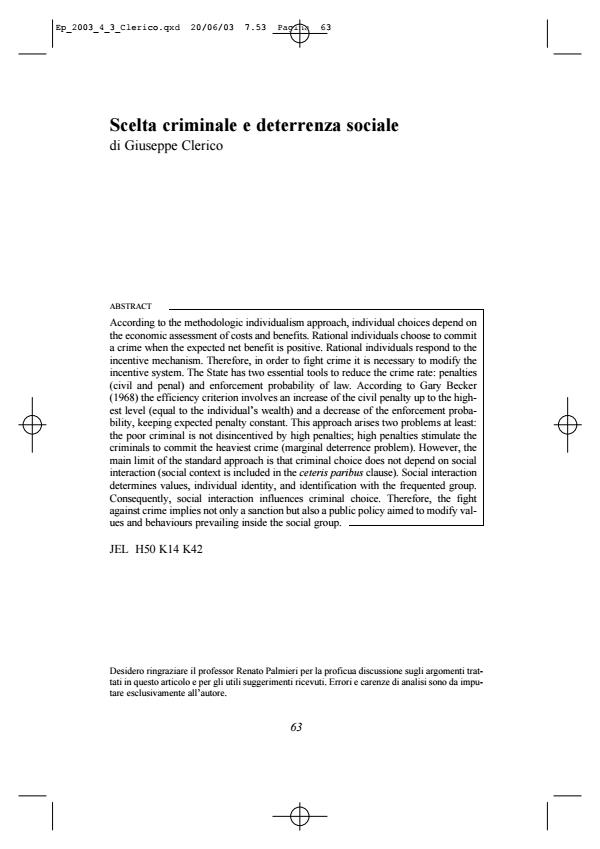Scelta criminale e deterrenza sociale
Titolo Rivista ECONOMIA PUBBLICA
Autori/Curatori Giuseppe Clerico
Anno di pubblicazione 2003 Fascicolo 2003/4
Lingua Italiano Numero pagine 26 P. Dimensione file 128 KB
DOI
Il DOI è il codice a barre della proprietà intellettuale: per saperne di più
clicca qui
Qui sotto puoi vedere in anteprima la prima pagina di questo articolo.
Se questo articolo ti interessa, lo puoi acquistare (e scaricare in formato pdf) seguendo le facili indicazioni per acquistare il download credit. Acquista Download Credits per scaricare questo Articolo in formato PDF

FrancoAngeli è membro della Publishers International Linking Association, Inc (PILA), associazione indipendente e non profit per facilitare (attraverso i servizi tecnologici implementati da CrossRef.org) l’accesso degli studiosi ai contenuti digitali nelle pubblicazioni professionali e scientifiche.
According to the methodologic individualism approach, individual choices depend on the economic assessment of costs and benefits. Rational individuals choose to commit a crime when the expected net benefit is positive. Rational individuals respond to the incentive mechanism. Therefore, in order to fight crime it is necessary to modify the incentive system. The State has two essential tools to reduce the crime rate: penalties (civil and penal) and enforcement probability of law. According to Gary Becker (1968) the efficiency criterion involves an increase of the civil penalty up to the highest level (equal to the individual’s wealth) and a decrease of the enforcement probability, keeping expected penalty constant. This approach arises two problems at least: the poor criminal is not disincentived by high penalties; high penalties stimulate the criminals to commit the heaviest crime (marginal deterrence problem). However, the main limit of the standard approach is that criminal choice does not depend on social interaction (social context is included in the ceteris paribusclause). Social interaction determines values, individual identity, and identification with the frequented group. Consequently, social interaction influences criminal choice. Therefore, the fight against crime implies not only a sanction but also a public policy aimed to modify values and behaviours prevailing inside the social group.
Giuseppe Clerico, Scelta criminale e deterrenza sociale in "ECONOMIA PUBBLICA " 4/2003, pp , DOI: